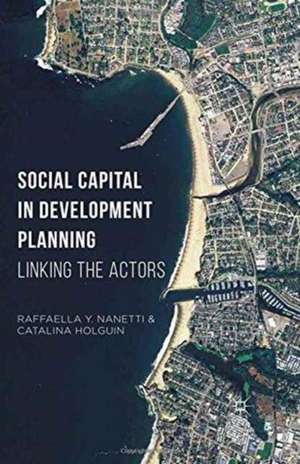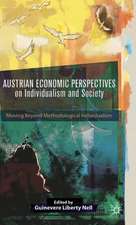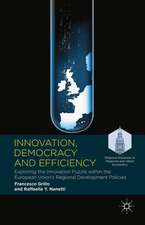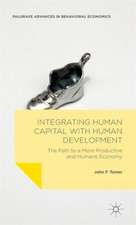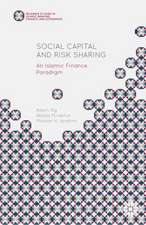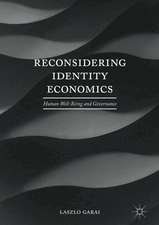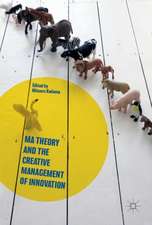Social Capital in Development Planning: Linking the Actors
Autor Raffaella Y. Nanetti, Catalina Holguinen Limba Engleză Paperback – 11 noi 2015
In the last thirty years, social capital has become a forceful concept in the social sciences, the subject of many scholarly works and a topic of keen interest and debate in policy circles. Yet the main focus has been on defining and measuring social capital, with little attention given to its value in promoting development policies.Social Capital in Development Planning updates and advances the debate on social capital through the analysis of the application of the concept of social capital to programs for sustainable and smart socioeconomic development; empirical findings; and a new paradigm for development planning.
| Toate formatele și edițiile | Preț | Express |
|---|---|---|
| Paperback (1) | 636.94 lei 6-8 săpt. | |
| Palgrave Macmillan US – 11 noi 2015 | 636.94 lei 6-8 săpt. | |
| Hardback (1) | 642.18 lei 6-8 săpt. | |
| Palgrave Macmillan US – 9 noi 2015 | 642.18 lei 6-8 săpt. |
Preț: 636.94 lei
Preț vechi: 749.34 lei
-15% Nou
Puncte Express: 955
Preț estimativ în valută:
121.88€ • 127.25$ • 100.87£
121.88€ • 127.25$ • 100.87£
Carte tipărită la comandă
Livrare economică 05-19 aprilie
Preluare comenzi: 021 569.72.76
Specificații
ISBN-13: 9781349572601
ISBN-10: 1349572608
Pagini: 267
Ilustrații: VIII, 267 p.
Dimensiuni: 140 x 216 mm
Greutate: 0.32 kg
Ediția:1st ed. 2016
Editura: Palgrave Macmillan US
Colecția Palgrave Macmillan
Locul publicării:New York, United States
ISBN-10: 1349572608
Pagini: 267
Ilustrații: VIII, 267 p.
Dimensiuni: 140 x 216 mm
Greutate: 0.32 kg
Ediția:1st ed. 2016
Editura: Palgrave Macmillan US
Colecția Palgrave Macmillan
Locul publicării:New York, United States
Cuprins
1. Introduction
2. Social Capital: Elements and Dimensions
3. The Feasibility of Constructing Social Capital
4. Development and Not Just Growth
5. The Path to Development Through Social Capital
6. Social Capital in Neighborhood Development: Pianura, Naples
7. Social Capital in Educational Policy: Spain
8. Conclusions: Linking the Actors for Continuity and Sustainability
2. Social Capital: Elements and Dimensions
3. The Feasibility of Constructing Social Capital
4. Development and Not Just Growth
5. The Path to Development Through Social Capital
6. Social Capital in Neighborhood Development: Pianura, Naples
7. Social Capital in Educational Policy: Spain
8. Conclusions: Linking the Actors for Continuity and Sustainability
Recenzii
"In this important book, Nanetti and Holguin start out by distinguishing between growth and development within territorial communities. They then demonstrate, through careful theoretical analysis and revealing case studies, how nurturing social capital promotes development, defined as the realization of social justice." - Susan S. Fainstein, Senior Research Fellow, Harvard University Graduate School of Design, USA
"This is a timely and important volume. In an era of rising social inequalities and climate change, finding an alternative to the growth models inherited from the past may be the most pressing issue of our time. The authors of this volume demonstrate that building social capital is the path forward that best addresses the challenges of the twenty-first century." - Dennis R. Judd, Professor and Interim Head, University of Illinois at Chicago, USA
"Over the last quarter century, research on 'social capital' has exploded. Articles on the topic have risen fromone every five years to one every five hours. Nanetti, a pioneer in this field, has now produced with Holguin a masterly, innovative account of social capital in development planning." - Robert D. Putnam, Peter and Isabel Malkin Professor of Public Policy, Harvard University, USA; author of Our Kids
"This is a timely and important volume. In an era of rising social inequalities and climate change, finding an alternative to the growth models inherited from the past may be the most pressing issue of our time. The authors of this volume demonstrate that building social capital is the path forward that best addresses the challenges of the twenty-first century." - Dennis R. Judd, Professor and Interim Head, University of Illinois at Chicago, USA
"Over the last quarter century, research on 'social capital' has exploded. Articles on the topic have risen fromone every five years to one every five hours. Nanetti, a pioneer in this field, has now produced with Holguin a masterly, innovative account of social capital in development planning." - Robert D. Putnam, Peter and Isabel Malkin Professor of Public Policy, Harvard University, USA; author of Our Kids
Notă biografică
Raffaella Y. Nanetti is Professor Emerita of Urban Planning and Policy at the University of Illinois at Chicago, USA, where she taught courses in international and community development. She is Senior Researcher at Esoc-Lab, London and Associate at the National Research Council, Italy. She has directed community projects in the Balkans, Europe, and the USA, and has published extensively.
Catalina Holguin is Associate Researcher at the Economic and Social Cohesion Laboratory, UK. She has a PhD in Social Capital and Education Policy from the London School of Economics, UK. She has experience in European research projects on social capital, social cohesion, EU policies, and multilevel governance. Holguin is currently working on social capital and development in post-conflict societies.
Catalina Holguin is Associate Researcher at the Economic and Social Cohesion Laboratory, UK. She has a PhD in Social Capital and Education Policy from the London School of Economics, UK. She has experience in European research projects on social capital, social cohesion, EU policies, and multilevel governance. Holguin is currently working on social capital and development in post-conflict societies.
Textul de pe ultima copertă
The pursuit of sustainable development and smart growth is a main challenge today in countries around the world. Social capital is an asset of their territorial communities. It is also a precondition for national and local policies that aim to better the economic base and quality of life for all. This change is socially diffused, economically sustainable over time, and smart in its content. A significant stock of social capital facilitates such results because it links into the process of development planning institutional decision makers and socioeconomic stakeholders who share trust, solidarity norms, and a community vision.
In the last thirty years, social capital has become a forceful concept in the social sciences, the subject of many scholarly works and a topic of keen interest and debate in policy circles. Yet the main focus has been on defining and measuring social capital, with little attention given to its value in promoting development policies.Social Capital in Development Planning updates and advances the debate on social capital through the analysis of the application of the concept of social capital to programs for sustainable and smart socioeconomic development; empirical findings; and a new paradigm for development planning.
In the last thirty years, social capital has become a forceful concept in the social sciences, the subject of many scholarly works and a topic of keen interest and debate in policy circles. Yet the main focus has been on defining and measuring social capital, with little attention given to its value in promoting development policies.Social Capital in Development Planning updates and advances the debate on social capital through the analysis of the application of the concept of social capital to programs for sustainable and smart socioeconomic development; empirical findings; and a new paradigm for development planning.
